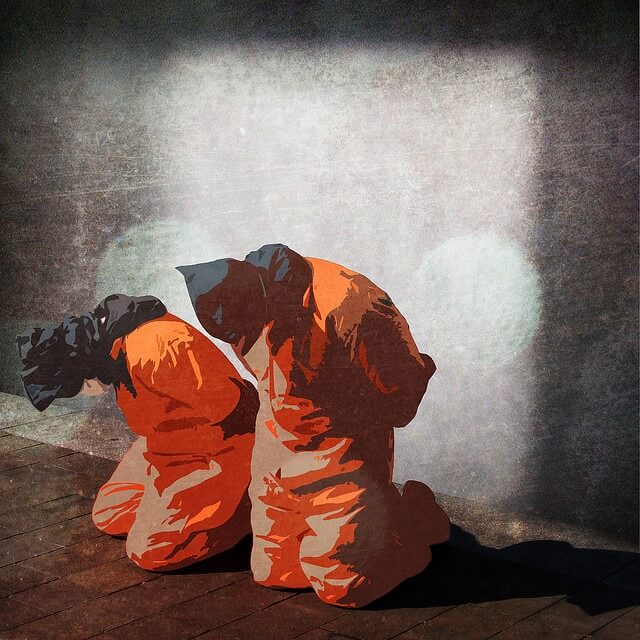Articles
Guantanamo Bay 20 Years on: A symbol of US impunity and torture
Audio


The 11th of January 2022 will mark 20 years since the first men set foot in the Guantanamo Bay detention centre. Hooded, shackled, restrained by ear defenders and the now iconic orange jumpsuits, these men were presented to the world as trophies of the US’s swift and brutal vengeance; “The worst of the worst” as described by President George W. Bush.
<h2>Lifting the hood</h2>
The images and accounts of torture at Guantanamo disturbed the world, but very few dared to question the legitimacy of holding prisoners in the camp, and even fewer attempted to lift the hoods to uncover the humans underneath.
CAGE was born in 2003 to do exactly that. Through piecing together the testimonies of families, survivors and observers, CAGE built the first database containing the names and faces of the men held at Guantanamo. Over the past two decades, CAGE has amplified the voices of the survivors of Guantanamo and in doing so, unravelled the myth that these men represented an existential threat, or “the worst of the worst”. They were in fact fathers, sons, grandfathers, doctors, engineers, religious men, business men, artists, respected tribesmen and more. The US war machine needed a target to validate its relentless thirst for war, the 779 men trafficked into Guantanamo were its victims.
As more men were released from Guantanamo over the years, recognition and anger grew over the legal and moral travesty that it represented. The US sought to undermine every legal or political avenue to hinder efforts by prisoners to hold them to account. This did little to minimise the flood of public condemnation.
<h2>Broken Promises</h2>
It is for this reason that ‘progressive’ Obama promised to close the facility - to stem America’s haemorrhaging international prestige. He failed to do so. Meanwhile Trump, representing the unvarnished face of American exceptionalism, held no such concerns, believing that it should remain open and be loaded up further with “bad dudes”.
Biden promised to close it again, but has instead signed off on the National Defense Authorization Act, which will effectively make it impossible for him to deliver on that.
In real terms, for prisoners still held at Guantanamo, consecutive Democrat and Republican administrations have all been consistent supporters of their detention and abuse.
While representing another notch in a string of broken promises from US Presidents, the National Defense Authorization Act only further clarifies how Guantanamo Bay is intimately bound up with the broader project of American violence and its military-industrial complex - and is a stark reminder that campaigns cannot focus narrowly on the facility itself without challenging the War on Terror that it has come to symbolise.
<h2>The Guantanamisation of society</h2>
While Guantanamo Bay and the plight of its remaining prisoners has faded from view over the years, it remains an integral part of the legacy of the War on Terror.
The Islamophobia that the facility thrived on has been mainstreamed across the world. After all, the centre exclusively imprisoned only Muslim men. The lawlessness of the detention system has become normalised in the countless policies instituted which have stretched the boundaries of state power and repression beyond recognition.
And the moral black hole of Guantanamo Bay and the War on Terror have eroded the soul of the United States, contributing in no small part to the social crisis on its shores today.
This anniversary is also the culmination of CAGE’s “International Witness Campaign”. Launched in September 2021, this 5 month-long campaign, alongside over 50 global partners aimed to highlight the devastation of two decades of the failed War on Terror.
The results of the last two decades of the war on terror has been forever wars abroad and the erosion of rights and freedoms domestically. It has led to loss of credibility, standing, principles and morals on the part of the US and its allies.
Guantanamo plays a central role in that tarnished legacy.
We conclude with comments by Moazzam Begg, former Guantanamo prisoner and Outreach Director at CAGE:
<i>“Most of the Guantanamo prisoners had never been to America, but America came to them. They came from over forty different countries and saw something no one else did. While nine prisoners never left Guantanamo alive and 39 remain imprisoned, the rest of us told the world what we saw and made sure the world’s most infamous prison was never forgotten.” </i>
<i>“America must show that it is ready to correct the wrongs of the past. Two decades on, President Biden must now close Guantanamo.”</i>
[END]
Download Files
No items found.


Guantanamo Bay 20 Years on: A symbol of US impunity and torture
Articles


Guantanamo Bay 20 Years on: A symbol of US impunity and torture
Articles




